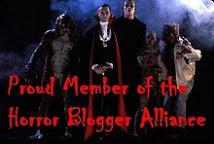Review by The Mike.
I hope that someday, when I get old, I'll be able to look back at my life with the wisdom shown by a Stephen King narrator. King has often been able to tell a story from the viewpoint of a grown man looking back on his tumultuous youth - for us movie fans the easy example is when Richard Dreyfus told the story of Stand By Me, though my favorite might be the lead character from his more recent tale Riding the Bullet - and he does it again in Joyland, a 2013 novel that offers just enough of the supernatural and the homicidal to suck a horror fan like me into this fantastic coming-of-age story.
At the center of the book, telling his tale from an older and wiser future, is a man named Devin Jones who went by Dev or Jonesy when he was a 21 year old amusement park employee in the summer of 1973. Jonesy, as I'd like to call him, is an altruistic English student, a virgin who spends his summer pining for the girl he lost while listening to The Doors and reading The Lord of the Rings when he's not working, and someone who just seems to bring out the best in the people around him. Maybe that's because he's the one telling us the story - our narrator does point out that everyone makes their past sound a little more exciting than it really was - but when we like the guy so much we're willing to go along with their version of events.
Jonesy's dramatic tale features plenty of interesting characters - carnies and college kids and a librarian and a sick kid and more - and all of them seem to orbit around his place of employment, the fictional North Carolina amusement park which shares its name with the novel. Joyland isn't a big deal of a place and Jonesy never paints the most glamorous picture of it, but he and King certainly paint it as an environment that would inspire someone to mutter that the place "has character." King is more than willing to pull back some curtains in the entertainment business, providing Jonesy and his co-workers with their own lingo that he dubs "the Talk," but most of the seedy prejudices you might have about carnival workers are absent from this book. King doesn't want us to think of Joyland as a bad place, despite some of the terrible things he creates there.
Those who know Stephen King's work (at this point in his career, is there anyone who doesn't?) might be surprised at how much of the book (which runs a meager 280ish pages in total) is about the carnival life and our lead's self-discovery during his time away from school. King does everything in his power to make Jonesy seem like a good kid - thanks to his narration from thirty years later things like suicidal tendencies and masturbation are brushed off as dumb kid stuff - but it never seems too forced. It's essential to Joyland that the reader truly likes Jonesy, and after finishing the book I don't see how anyone couldn't. He's a sweet character who is slightly one note, but he's never too simple or cliche.
This is a Stephen King book, and you're right to expect something sinister, but it's one of his most restrained supernatural tales. There are hints that some characters possess what his other books might call "a shine" and there's a ghost and there's talk about a few brutal (but not so brutal that you wouldn't see them on a prime time network drama) murders inside the story. Joyland left me wanting a little more in these areas - there are lots of explanations of experiences had by others but not enough direct reader-meets-evil moments to keep a more cynical horror fan's attention - but it's also a bit poetic how King manages to tell a story of a killing and a haunting without losing the book's more life-affirming message.
Joyland worked for me because it's written like so many other great King stories of redemption and growth and hope - themes that often get forgotten when people want to talk about Pennywise the Clown or Randall Flagg or Jack Torrance and his axe - and because it manages to keep a positive twist on death and the macabre. The book is full of death and sadness, but its structure - especially all the asides from the older Jonesy that key us in to some twists down the road - provides plenty of levity that keeps us from
sinking too far into the darker details of the story. It feels like this was all so simple to King - this is one the slightest books I've ever read from him - but I couldn't help being impressed when I realized how invested I was in this character and the events that made his time at Joyland so unforgettable. Joyland isn't an epic of terror like some of his more renowned classics, but it's a reminder that the author can still grab our focus and hold it for as long as he likes.
I'll Spin You a Yarn
1 day ago










1 comment:
No one does coming-of-age like Stephen King, and nothing turns me into a weepy bitch like a good coming-of-age story. One of my favorite things King has ever written was the Story "Low Men in Yellow Coats" from Hearts in Atlantis. Breaks me in half every time. I'll have to check this one out.
Post a Comment